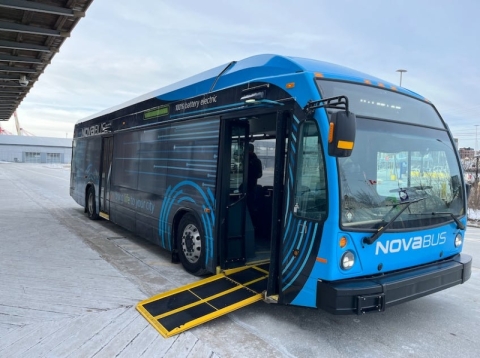Travel
Halifax Transit's First Electric Bus
Arrives December 4th, 2023

Electric Bus Arrives Dec/4th/23 (Source: Halifax Regional Municipality )
USPA NEWS -
Since 1981, millions of Haligonians have relied on Halifax Transit for safe reliable public transportation. Whether traveling to work, attending appointments, shopping, exploring different parts of the city, or just needing reliable transportation when not able to get behind the wheel, Halifax Transit has established a familiar presence within the Halifax Regional Municipality.
Public records from 2019/2020, state that Halifax Transit assets include 369 buses, 5 Ferries, and 47 paratransit buses. Halifax Transit reports an average weekday ridership of 99,320 passengers, an annual ridership of 30.4 million passengers, and covers over 75 routes.
Public records from 2019/2020, state that Halifax Transit assets include 369 buses, 5 Ferries, and 47 paratransit buses. Halifax Transit reports an average weekday ridership of 99,320 passengers, an annual ridership of 30.4 million passengers, and covers over 75 routes.
Over the last 4 decades, public transportation has been encouraged as a way for people for in larger urban areas to reduce emissions from heavy reliance on personal automobiles which contribute to climate change. In 2023, the message is still the same, but only more urgent as climate change has become a serious global concern. Many public transit providers across the country and around the world are stepping up to the plate and taking more aggressive measures to meet zero emission goals.
Halifax Transit is no exception and has introduced an ambitious plan to contribute to the fight by introducing the Zero Emission Bus Project.
This is the first project of its kind in the Atlantic provinces and was approved by the Halifax Regional Municipality Council in May of 2023. The highlights of this project include; at least 200 electric buses being added to the Halifax Transit fleet,(Phase 1 will see delivery of 60 electric buses), expansion of the Ragged Lake Transit facility and rebuild of the Burnside Transit facility to an eco-friendly environment to meet a net-zero goal.
Halifax Transit's first electric bus arrived on December 4th, 2023, with the other 59 electric buses in the Phase 1 scheduled to be delivered by the end of 2024.
For more details on the Zero Emissions Bus Project see,
https://www.halifax.ca/transportation/halifax-transit/zero-emission-bus-project?fbclid=IwAR14Lor00bYJK84G28iOCB_jGRLQpaGcbQc3OtbtqGGXB0gAo0LGgFCiR0w
During the testing phase Halifax Mayor, Mike Savage and many HRM City Counsellors were given a tour of the electric bus and a ride to demonstrate it's capabilities in handling the typical operation environment throughout the region.
Halifax Transit’s executive director Dave Reage had this to say, "Testing was designed to cover a representative spectrum of typical driving conditions in revenue service, including varied terrain, traffic, weather, and gross vehicle weight.
Results of that testing indicated no significant concerns with respect to performance or range, even in low temperatures or snow conditions.
Reage went on to say, "The new battery powered buses will be added to the current fleet based out of the Ragged Lake Transit facility. An RFP for construction of four new lanes and installation of charging equipment for the Ragged Lake Transit facility has been released, and construction is expected to begin very soon. Upon completion of the new extension, electric buses are expected to be in revenue service by spring 2024."
Councillor Waye Mason expressed his great enthusiasm for the new battery powered buses. After a demo ride he posted to Twitter, “What a game changer! For folks inside the bus, no shake, rattle and roll, just a gentle whine as it climbed Duke Street from a dead stop. Plenty of power. Outside the bus, no gut-grabbing bassy rumble as the bus goes by, and no dark cloud of diesel particulates. And, of course, far less GHGs…This is a good future for us!”
Liability for this article lies with the author, who also holds the copyright. Editorial content from USPA may be quoted on other websites as long as the quote comprises no more than 5% of the entire text, is marked as such and the source is named (via hyperlink).









